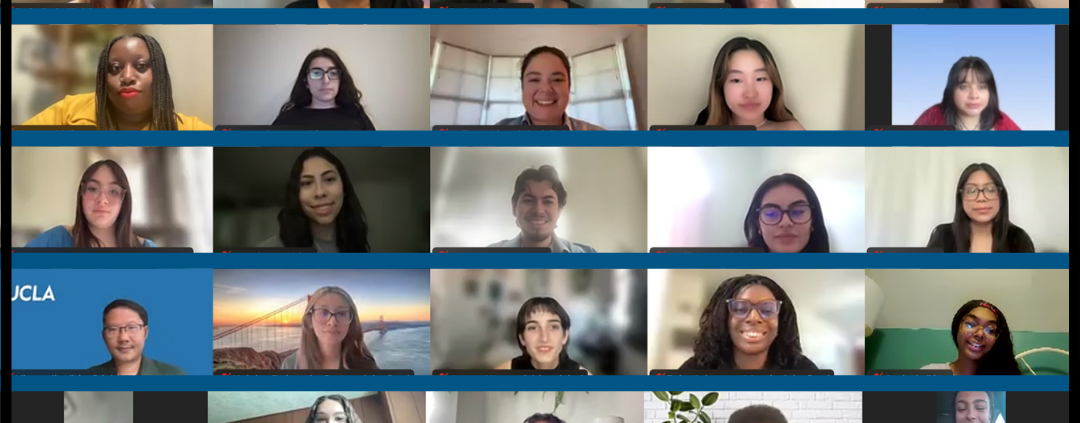Summer Research Incubator Bridges UCLA and Morgan State for First Time
Students gain intensive research experience, mentorship, and new perspectives in humanities, arts, and social sciences.
By Kayla McCormack | August 26, 2025
This summer, 26 undergraduates from UCLA and Morgan State University spent six weeks tackling big questions around identity, power, and social change in the UCLA Summer Research Incubator (SRI). Launched in 2022 by UCLA’s Undergraduate Research Center for Humanities, Arts and Social Sciences (URC-HASS), the virtual program aims to give students their first research experience while preparing them for more advanced research opportunities.
“Research experiences in the humanities, arts, and social sciences equip students with the skills to approach problems from multiple perspectives, think critically about the world we live in, and challenge the status quo,” Jacquelyn Ardam, Director of URC-HASS and founder of the SRI. “By researching important topics such as education, immigration, disability, and media literacy, in the SRI our students ask — and answer — important questions about the most pressing challenges our world faces today.”
This year, SRI welcomed students from Morgan State University (MSU) through the UC-HBCU Initiative, an effort to expand research opportunities for Historically Black Colleges and Universities.
“UCLA and MSU students both fully engaged with the program and benefitted from the cross-campus collaboration,” said Laura Ha Reizman, assistant director of the URC-HASS and SRI program director. “Being exposed to peers from different universities is a form of institutional diversity that allows students to learn from one another.”
A Virtual Model That Centers Community
The SRI operates entirely online, which helps democratize this early-research opportunity by giving students the flexibility to balance research with work, classes, or other responsibilities. Participants meet weekly in seminars, workshops, and one-on-one mentorship sessions, gaining guidance in research design, ethical scholarship, and graduate school preparation.
Graduate mentors play a central role in the program, offering hands-on support for project development, data analysis, and presentations.“It’s been beautiful to watch students learn how to use me as a mentor,” said Nicole Prucha, a Ph.D. candidate in English and one of the SRI graduate mentors. “They’re asking questions not just about writing, but about things like imposter syndrome or feeling like their research could have been more expansive or more creative. Really wrestling with some of the bigger questions that come with being a researcher.
Each research project in the SRI focuses on themes of diversity, equity, inclusion, and social justice. Whether examining historical movements or contemporary social policies, students are encouraged to explore topics that resonate with their lived experiences or communities they care deeply about.
Teyoltlahui Gonzalez, a second year at UCLA studying international development and Chicana/o studies, examined the militarization of marginalized high schools. Her project, inspired by her own high school experiences, explores how Section 9528 of the No Child Left Behind Act enables military recruitment in K-12 public schools, and how JROTC helps perpetruate that.”
“Having one-to-one meetings with my graduate mentor helped me get personalized feedback so I was able to establish a stronger foundation in research, especially in the early stages,” Gonzalez said. “It also helped me turn my curiosity to a real and presentable research project that I was proud of.”
Morgan State second year psychology major Atiya Ba’th investigated barriers faced by people with criminal histories in Maryland. Her project looks at how legislation and rehabilitation practices affect discrimination in hiring.
Emilia Magdaleno, a fourth year at UCLA examined the experiences of English language learners in California public schools. Her project explores how informal spaces in schools can shape students’ sense of inclusion.
“Understanding how to organize such a big project was so impactful. I learned how to use tools like Zotero, how to analyze articles, and how to connect the literature to the interviews I conducted,” said Magdaleno. “Putting those pieces together was incredibly rewarding.”
The program concludes with the SRI Virtual Symposium, where students present their work to peers, mentors and the UCLA community. Beyond developing research skills, the SRI encourages critical thinking, civic engagement, and leadership.
“This program empowers students to explore questions of diversity, equity, and social justice, fostering critical thinking, creativity, and civic responsibility,” said Lisa D. Brown, Director of the Office of Undergraduate Research and associate professor of biology at MSU. “These experiences not only prepare students for graduate study and future careers but also equip them to become leaders who can use research as a tool for societal change.”
As the 2025 cohort wraps up their time with SRI, students are already looking ahead to how the program might continue to grow. “I hope that this program continues running and expanding to different schools because I truly believe it is a valuable experience,” said Ba’th. “I learned a lot about different ways to conduct and explain my research, and I can carry these skills with me.”
The SRI is part of UCLA’s broader belief that Research Powers Progress, not only through groundbreaking discoveries, but by expanding opportunity. Students gain technical skills, build confidence, and sharpen the kind of critical thinking that will benefit them in any future career.




